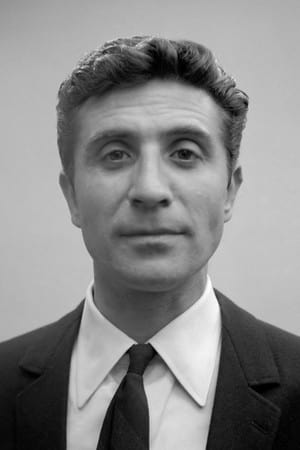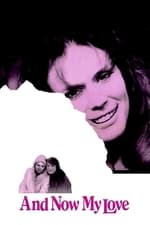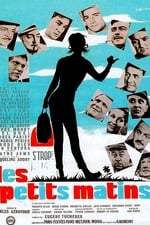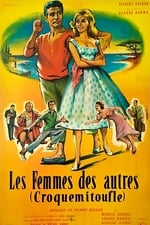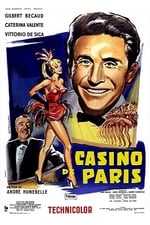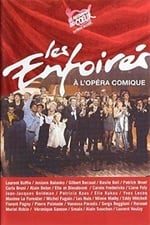Informació personal
Cèlebre per Interpretació
Crèdits coneguts 56
Gènere Home
Data de naixement 24 e de 1927
Dia de la mort 18 " de 2001 (74 anys)
Lloc de naixement Toulon, Var, France
D'altres noms
- Gilbert François Léopold Bécaud
- Gilbert Bécaud und Ballett
- Gilbert Becaud
- François Silly
- François Bécaud
Puntuació del contingut
100
Sí! Fa goig de veure!
Inicieu la sessió per a informar d'un problema
Biografia
Gilbert Bécaud (24 October 1927 – 18 December 2001) was a French singer, composer, pianist and actor, known as "Monsieur 100,000 Volts" for his energetic performances. His best-known hits are "Nathalie" and "Et maintenant", a 1961 release that became an English language hit as "What Now My Love". He remained a popular artist for nearly fifty years, identifiable in his dark blue suits, with a white shirt and "lucky tie"; blue with white polka dots. When asked to explain his gift he said, "A flower doesn't understand botany." His favourite venue was the Paris Olympia under the management of Bruno Coquatrix. He debuted there in 1954 and headlined in 1955, attracting 6,000 on his first night, three times the capacity. On 13 November 1997, Bécaud was present for the re-opening of the venue after its reconstruction.
Born François Gilbert Léopold Silly in Toulon, France, Bécaud learned to play the piano at a young age, and then went to the Conservatoire de Nice. In 1942, he left school to join the French Resistance during World War II. He began songwriting in 1948, after meeting Maurice Vidalin, who inspired him to write his early compositions. He began writing for Marie Bizet; Bizet, Bécaud and Vidalin became a successful trio, and their partnership lasted until 1950.
In 1952, he married Monique Nicholas. They had three children.
While touring with Jacques Pills as a pianist, Bécaud met Édith Piaf, Pills' wife at the time. He began singing at her suggestion in 1953, with "Mes Mains" and "Les Croix". His first performance came the year after. His hits in the later part of the decade included "La Corrida" (1956), "Le Jour où la Pluie Viendra" (1957), and "C'est Merveilleux L'amour" (1958).
His first hit in the English-speaking world was Jane Morgan's cover version of "Le jour où la pluie viendra" (as "The Day the Rains Came", with English lyrics by Carl Sigman) in 1958. He began acting in the same period, starting with "Le Pays D'où Je Viens" (1956). In 1960, he won a Grand Prix du Disque and composed "L'enfant à L'étoile," a Christmas cantata. That same year, "Let It Be Me", an English version of his "Je t'appartiens", became a hit for the Everly Brothers, followed, over the years, by Bob Dylan, Nina Simone, Elvis Presley, Willie Nelson, Jerry Butler, Sam & Dave and James Brown.
In 1973 he married Kitty Saint-John, with whom he had two children. He died of cancer at the age of 74.
In 1961, Bécaud wrote and recorded "Et Maintenant", one of the biggest selling singles in French history. Translated as "What Now My Love", the song became a hit by Shirley Bassey, Sonny & Cher, Elvis Presley, Judy Garland, Andy Williams, Herb Alpert and Frank Sinatra.
In 1962, he completed his largest composition, the 2-act opera L'Opéra d'Aran, which was premiered at the Théâtre des Champs-Élysées on 25 October 1962 (Georges Prêtre conductor). The plot of the opera takes place on the Aran Islands, off the west coast of Ireland, although Bécaud had never been to Ireland before. ...
Source: Article "Gilbert Bécaud" from Wikipedia in English, licensed under CC-BY-SA 3.0.
Gilbert Bécaud (24 October 1927 – 18 December 2001) was a French singer, composer, pianist and actor, known as "Monsieur 100,000 Volts" for his energetic performances. His best-known hits are "Nathalie" and "Et maintenant", a 1961 release that became an English language hit as "What Now My Love". He remained a popular artist for nearly fifty years, identifiable in his dark blue suits, with a white shirt and "lucky tie"; blue with white polka dots. When asked to explain his gift he said, "A flower doesn't understand botany." His favourite venue was the Paris Olympia under the management of Bruno Coquatrix. He debuted there in 1954 and headlined in 1955, attracting 6,000 on his first night, three times the capacity. On 13 November 1997, Bécaud was present for the re-opening of the venue after its reconstruction.
Born François Gilbert Léopold Silly in Toulon, France, Bécaud learned to play the piano at a young age, and then went to the Conservatoire de Nice. In 1942, he left school to join the French Resistance during World War II. He began songwriting in 1948, after meeting Maurice Vidalin, who inspired him to write his early compositions. He began writing for Marie Bizet; Bizet, Bécaud and Vidalin became a successful trio, and their partnership lasted until 1950.
In 1952, he married Monique Nicholas. They had three children.
While touring with Jacques Pills as a pianist, Bécaud met Édith Piaf, Pills' wife at the time. He began singing at her suggestion in 1953, with "Mes Mains" and "Les Croix". His first performance came the year after. His hits in the later part of the decade included "La Corrida" (1956), "Le Jour où la Pluie Viendra" (1957), and "C'est Merveilleux L'amour" (1958).
His first hit in the English-speaking world was Jane Morgan's cover version of "Le jour où la pluie viendra" (as "The Day the Rains Came", with English lyrics by Carl Sigman) in 1958. He began acting in the same period, starting with "Le Pays D'où Je Viens" (1956). In 1960, he won a Grand Prix du Disque and composed "L'enfant à L'étoile," a Christmas cantata. That same year, "Let It Be Me", an English version of his "Je t'appartiens", became a hit for the Everly Brothers, followed, over the years, by Bob Dylan, Nina Simone, Elvis Presley, Willie Nelson, Jerry Butler, Sam & Dave and James Brown.
In 1973 he married Kitty Saint-John, with whom he had two children. He died of cancer at the age of 74.
In 1961, Bécaud wrote and recorded "Et Maintenant", one of the biggest selling singles in French history. Translated as "What Now My Love", the song became a hit by Shirley Bassey, Sonny & Cher, Elvis Presley, Judy Garland, Andy Williams, Herb Alpert and Frank Sinatra.
In 1962, he completed his largest composition, the 2-act opera L'Opéra d'Aran, which was premiered at the Théâtre des Champs-Élysées on 25 October 1962 (Georges Prêtre conductor). The plot of the opera takes place on the Aran Islands, off the west coast of Ireland, although Bécaud had never been to Ireland before. ...
Source: Article "Gilbert Bécaud" from Wikipedia in English, licensed under CC-BY-SA 3.0.
Interpretació
So
|
|||
|
|||
|
|||
|
|||
|
